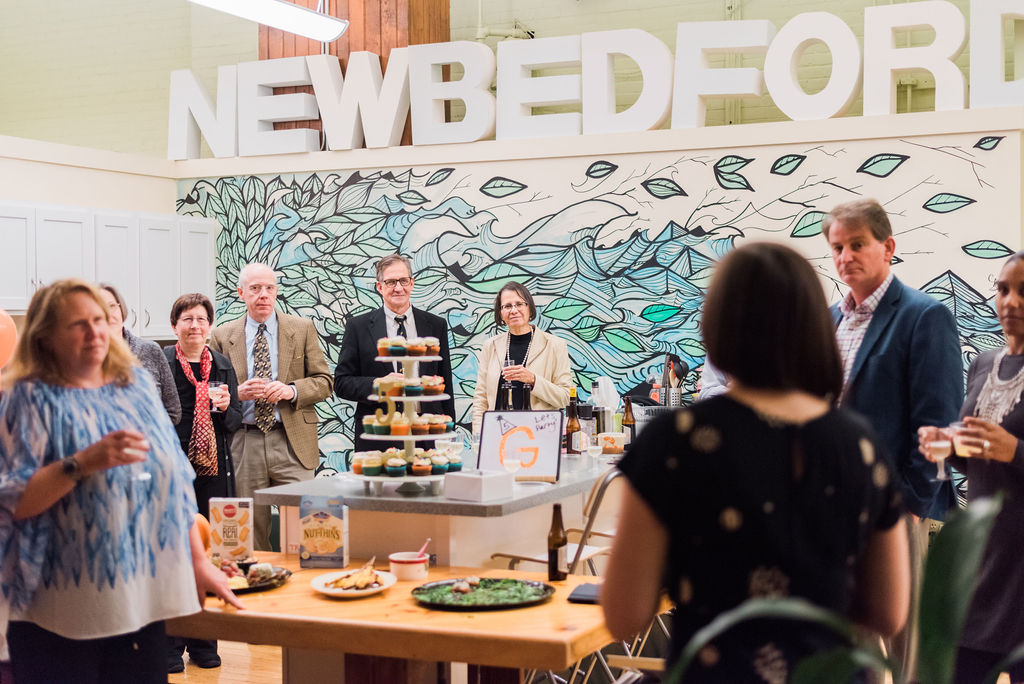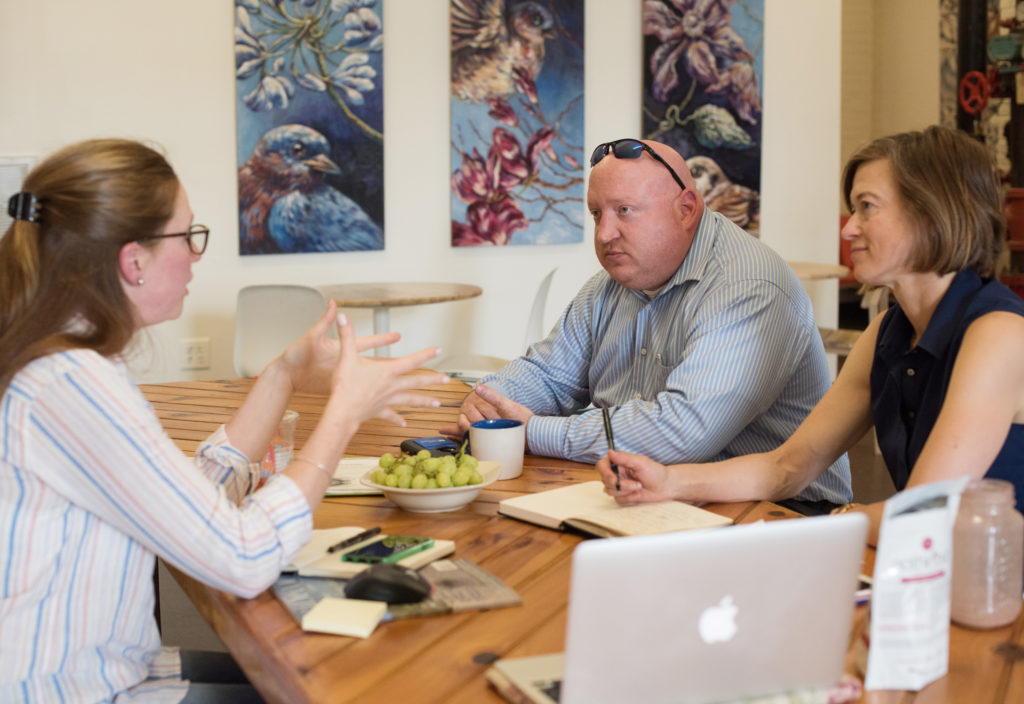How to build authentic community: tactics that work

If you are looking to build a community of any kind, getting started can be daunting. On a macro level, it is important to have your vision, purpose, and values in place so the right people will align to what you are doing. If you haven’t already, check out this post from our archives on What Makes a Community Thrive. It covers the macro view of community building with lessons from adolescent summer campers, Argentinian Buddhists, and seltzer fanatics.
On a micro level, there are specific tactics you can use to create a rock-solid foundation for a community that lasts. Here at Groundwork, we’ve been a community-driven coworking space from the beginning. We’ve found that all of our members, no matter how busy, want to feel like they’re part of a tribe. And while there’s nuance and magic involved with making this happen, there are also some very simple and repeatable tasks that you can build into your daily schedule. Let’s jump right in, and take a look at how to build authentic community with tactics that work:
Prioritize the welcome process
The onboarding process is a big to-do in the coworking world. Ours includes a welcome gift bag, a slide show covering our values, and a polaroid photo shoot. Yours doesn’t have to be quite so formal, but the important thing here is to take time to deliberately welcome each individual into your community. Your number one job during the welcome is to ask questions and listen. Your goal is to understand what this person can offer as well as what they would like to receive from the experience. This early experience will set the tone for your new community member, and will guide you in facilitating a great experience.
I joined a non-profit organization a couple of years ago as a volunteer instructor. I received an email about a training the day before it was scheduled and I was unable to make it on such short notice. After that I received no further communication from the leadership. I had to ask a fellow volunteer to figure out when and where to show up for volunteer shifts. I felt so unwelcome, I started to wonder if they actually wanted me to be there or if I was just an imposition. I did not stay long, even though I loved the organization’s mission.
Don’t treat your people this way. Everything starts with the welcome. And remember, your most important job during the welcome is to listen.
Find and utilize unique talents
John McKnight, who created Asset Based Community Development (ABCD), asserted that community is built by focusing on people’s gifts rather than their deficiencies. He asserts that if we want to build strong communities, we should focus on assets, resources, and talents. In order to do this, we must pay attention to our community members. This is why the initial welcome process, and your role as a listener is so important.
After you have welcomed a new member to your community you should continue to observe and engage with them. Learn about the many facets of their lives. At Groundwork, we have an incredibly talented member who treats us to a live piano performance every month. Other members are amateur bakers, and they get to show off at our annual pie contest. A member who has worked a long career in the adult spirits industry treated us to a very educational vodka tasting. It is so rewarding to watch a person come alive while sharing their unique talents with our community. It creates a deep sense of belonging and mutual appreciation– and this is how you get people who show up to stay for a long time.
Communicate consistently and with repetition
Communication rhythm is one of the community-building tactics that is most often overlooked. Of everything listed here, it is also the most work. It is not surprising that so many underpaid and overworked community builders burn out on the communication piece. I’m going to break down our internal communication rhythm at Groundwork:
- Monthly (on the first Tuesday): A full newsletter that lays out the events for the upcoming months, introduces new members, and shares important updates about the business (new services or programming, expansion, partnerships, etc.)
- Weekly (on Monday mornings): An email detailing the events for the week and any additional community updates (holiday closings, reminders to clean up after yourself, etc.)
- Daily (throughout the day): Posts in Slack that include introducing new members, 15-minute reminders about events, conversation prompts, etc.
We stick to this rhythm with unwavering consistency. In fact, during the COVID pandemic when our physical space shut down, these communications became the glue that held us together. I encourage you to find a rhythm that you can stick to with unwavering consistency. The more frequent the better, but the important part is to stay consistent. Pick a schedule and stick to it come hell or high water.
Repetition is also key for getting your message across. If you look at our communication rhythm, you will notice that we tell our members about events three times: in the monthly newsletter, in the weekly email, and again on Slack. They are also seeing events visually on the calendar in our space. Repeat everything a minimum of three times!

Start small… and STAY small
I often speak with folks who are starting a new community and feel frustrated when only three people show up to an event. I tell them that I’ve been running Groundwork for 6+ years, our spce is nearly full, and we still host events with three people. And guess what? I love small events. It means that the people who attend can really get to know each other and trade quality conversation.
We have a few ongoing groups here at Groundwork. Meditation Mondays kept us sane during the pandemic with a 20-minute Zoom meditation led by a member. There were generally 3-5 people present for Meditation Mondays, and we forged a strong bond over the months by simply sitting in silence together. Then there’s the Marketing Lab, which meets every Wednesday. During the lab, we set weekly marketing goals and share them for accountability and feedback. The Lab generally consists of 3-5 people, and I feel like the conversation could get unwieldily with many more. As it is, we each have ample time to share and receive feedback. In Peter Block’s excellent book on community building, he shares:
Something almost mystical, certainly mysterious, occurs when citizens sit in a small group, for they often become more authentic and personal with each other there than in other settings.
Peter Block, Community: The Structure of Belonging
Six years into running Groundwork, and I have no desire to host lots of huge events. Large events require logistics and consume too much energy. Small and intimate groups are what make our community strong. So if you are feeling frustrated with event turnout, try a mental shift and plan for staying small. Small events are the glue in the cracks of our collective teapot.
Step back and let others do the work
Here’s the truth about most people who are drawn to building community: we work extremely hard, we are martyrs, we feel guilty asking for help, and we have a hard time letting go. If this sounds like you, I have some advice: let go of things early and often. The more you can involve your community members in meaningful work, the more invested they will be. If this challenges you because you feel guilty putting things on somebody else’s plate, start small. For example, we have one member who is an early-riser who starts the coffee every day. He loves doing this job, and it gives him a sense of responsibility and pride at Groundwork. I also love to encourage members to propose and host events, or contribute to our blog. In fact, once you are tuned into your members’ unique talents, it should be easy to know when to step back and let them take the stage.
Take that first step…
I hope these tactics help you as you endeavor to build an authentic community. Remember that you will not execute everything perfectly the first time out– Groundwork has been running for 6 years and we are constantly improving and updating our processes. The important thing is just to start. If you listen to your people and listen to your heart, you will find the way forward.
- Meet Our General Manager: Nicole Cosme - February 26, 2024
- Can I use a coworking space for Google My Business? - April 26, 2023
- Marketing Lab: The Best Business Resource on the South Coast You Didn’t Know About - March 23, 2023
